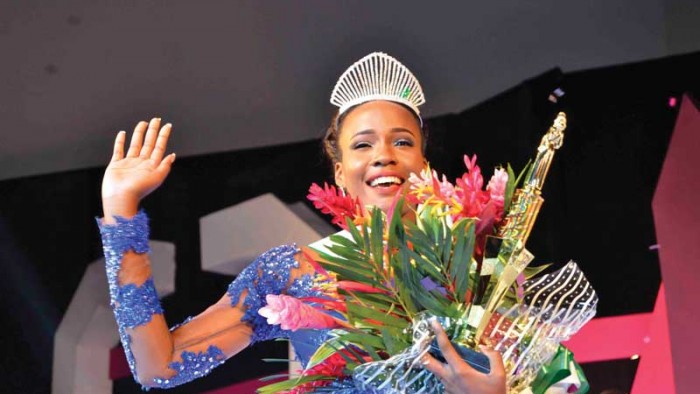 Social Sciences
Social Sciences
Here She Comes

Beauty pageants are big business in Nigeria. Travel the country and you’ll find they’re just about impossible to avoid. Newspapers and social media cover the pageants, and contest winners advertise cosmetics and promote other businesses, too.
When Oluwakemi “Kemi” Balogun first began studying Nigeria’s pageants, she was struck by how many people paid attention to them.
“Even people who told me that they didn’t care about these pageants had something to say about them,” said Balogun, an assistant professor in sociology and women’s and gender studies.
This level of national involvement would be remarkable anywhere. But it’s especially significant in a country as diverse as Nigeria, which is home to two major religions and more than 250 ethnic groups.
The pageants do much more than simply entertain a nation, Balogun says. They unite Nigerians within a national identity.
Balogun, who joined the university in 2013, studies gender, globalization, nationalism, race, and migration.
In her research on two pageants—Queen Nigeria and Most Beautiful Girl in Nigeria—Balogun shows distinctive but complementary visions of ideal Nigerian womanhood.
Queen Nigeria, designed specifically to appeal to a Nigerian audience, represents the domestic version of the nation’s ideal woman. Pageant participants are aspirational yet approachable—they’re easy for their fellow citizens to relate to.
These competitors blend modern sensibilities—they’re typically college-educated—with respect for tradition. Nigerian standards of modesty prevail: there’s no swimsuit event and skimpy outfits are discouraged. A cooking competition gives contestants the chance to show off their culinary skills by shopping for and preparing a regional dish.
If Queen Nigeria is an amped-up version of the girl next door, Most Beautiful Girl in Nigeria is her untouchably glamorous sister.
Don’t expect any cooking competitions here. A contestant in Most Beautiful Girl in Nigeria is a fashion-forward woman groomed to take her place in the country’s most elite echelons, and beyond.
In contrast to the demure mores of Queen Nigeria, participants are encouraged to wear body-revealing outfits and the swimsuit competition is a central element. In fact, during initial screening sessions, contestants model bikinis so judges can inspect them for scars and other physical imperfections that would make them less competitive in international pageants.
Winning Most Beautiful Girl in Nigeria is an honor, of course. But what makes it truly significant is its role as a pipeline to the global competitions. The top five contestants go on to events in Africa and abroad; the first runner-up competes in the Miss Universe contest, and the winner represents her country in Miss World.
Given the stakes, pageant judges aren’t focused on women who will appeal just to Nigerians. Instead, they want someone who has what it takes to “wow” at the international level.
To give contestants an extra edge, experts from the United States and South Africa provide coaching on grooming, catwalk poise, and more.
Although the pageant’s emphasis on international standards of beauty makes some uncomfortable, Balogun says it’s important for Nigerian women to represent their nation in this manner. It’s a way for the country—one of the world’s largest oil suppliers—to share the global stage with leading nations.
Balogun is currently working on a book that expands on her work with Queen Nigeria and Most Beautiful Girl in Nigeria, while considering other pageants as well.
“Pageants tell a really interesting story about what’s going on in Nigeria today,” Balogun said, “as well as the major transitions of the past 50 years.”
—Kit Alderdice
Photo caption: Miss Anambra, Unoaku Anyadike, won the Most Beautiful Girl in Nigeria 2015 pageant (Credit: Foto & Thingz by Nelson Joshua)


 Twitter
Twitter Facebook
Facebook Forward
Forward